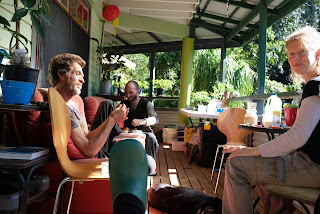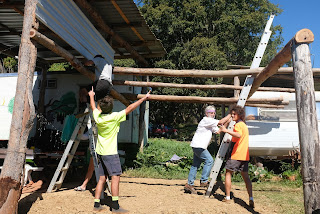This book can only connect you with nature and enhance your loving relationship and feeling of wholeness. Its a book that I've passed on to Charlie Mcgee, just like it came my way as a gift.
For only when we hear the language of other beings are we capable of understanding the generosity of Earth, and learning to give back our gifts in return.
How can we move towards ecological and cultural sustainability if we cannot even imagine what the path feels like?
Strawberries first shared my view of a world full of gifts simply schatteres at your feet. A gift comes to you through No action of your own, having moves toward you without your beckoning. It is not a reward; you cannot earn it or call it to you or even deserve it. And yet it appears. Your only role is to be open-eyed and present. Gifts in a really of huminulty and mystery - as with random acts of kindness we do not know their source.
Puhpowee, she explained means “the force which causes mushrooms to push up from the Earth overnight”... the makers of this word understood a world of being, full of undren energies that animate everything.
Water, land and even a day, the language a mirror for seeing the animacy of the world, the life that pulses through all things, through pines and nuthatches and mushrooms.
Thomas berrey “ we must say of the Universe that it is a communion of subjects, not a collection of objects”
Imagine walking through a richly inhabiles world of Birch people, Bear people, Rock people, beings we think of and therefore speak of as persons worthy of our respect, of inclusion in a peoples world
You wouldnt harm what gives you love. Knowing that you love the Earth changes you, activates you to defens and protect and celebrate. But when you feel the Earth loves you in return, that feeling transforms the relationship from a one way street to sacred bond.
In order to live i must consume. Thats the way the world works, the exchange of life, the endless cycling between my body and the world. If we are fully awake, a moral question arises as we exstinguish the other lives around us on the behalf of our own. Whether we are picking wild berries or going to the mall, how do we consume in a way that does justice to the lives we take?
Taking coal buried deep in the Earth, for which we must inflict unrepareable damage, violaers every perception of the code (honorable harvest). By No stretch of the imagination is coal “given”. We have to wound the land and water to gouge it from mother Earth. It doesnt mean we cant consume the energy we need, but it does mean that we honorably take only what is given. The wind blows everyday, everyday the sun shines, everyday the waves roll against the shore and the Earth is warm below us. We cant understand these renewable resources of energy given to us, since they are the sources that have powered life on the planet for long as there has been a planet. What will we use our energy for?
If all the world is a commodity, how poor we grow. When all the world is a gift in motion, how wealthy we become.
We understand a thing only when we understand it with all four aspects of our being: mind, body, emotion and spirit.
We set ourselves up as arbiters of what is good when often our standards of goodness are driven by narrow interest, of what we want.
Our work and joy is ti pass along the gift and to trust that what we put out into the Universe will always come back.
In a consumer society, contentment is a radical proposition. Recognizing abundance rather than scarcity undermines an economy that thrives by creating unmet desires. Gratitude cultivates an ethic of fullness, but the economy needs emptiness.
List of loving behaviour
Nurturing health and wellbeing
Protektion from harm
Encouraging individual growth and development
Desire to be together
Generous sharing of resources
Working together for a common goal
Celebration of shared values
Interdependence
Sacrifice by one for the other
Creation of beauty
Our appetit for sweet fruits leads ud to till, prune, irrigate, fertilize and weed on their behalf. Wild plants have changed to stand in well-behaved rows and wild humans have changed fo settle slog side the fields and care for plants - a kind of mutual taming.
What would it be like, I wondered, to live with that heightened sensitivity to the lives given for ours? To consider the tree in the kleenex, algae in the toothpaste, the oaks in the floor, the grapes in the wine; to follow back the thread of life in everything and pay it respect?
There is no official tax system to pay for ecosystem services, as we pay for snowplowing and schoolbooks. We get them for free, sonates continually by nature.
His role was not to control or chance the world as a human, but to learn from the world how to be human.
To be indigenous is to protect life on Earth. By honoring the knowledge in the land, and caring for its keepers, we start to become indigenous to place.
All powers have two sides, the power to create and the power to destroy. We must recognize them both, but invest our gifts on the side of creation.
When times are easy and there is plenty to go around, individual species can go it alone. In a world of scarcity, interconnection and mutual aid become critical for survival. So say the lichens.
When you have all the time in the world, you can spend it, not on going somewhere, but being where you are.
Maybe there is no such thing as time; there are only moments, each with its own story.
It is the Windigo way that tricks us into believing that belongings will fill our hunger, when its belonging we crave. The consumption-driven mindset masquerades as “quality of life” but eats us from within. Fed food that nourishes only emptiness.
The indigenous went on giving thanks to the land, although so much of the land had little reason ti be thankful for the people.
Until we can grieve for our planet we cannot love it - grieving is a sign if spiritual wealth. Even a wounded world is feeding us, holds us, giving us moments of wonder and joy. I choose joy over despair to return what Earth gives me daily. We are deluged by information regarding our destruction if the world and hear almost nothing about how to nurture it. Our natural inclination to do right by the world is stifled, breeding despair when it should be inspiring action.
What if we could fashion a restoration plan that grew from understanding multiple meanings of land? Land as sustainer. Land as identity. Land as a grocery store and pharmacy. Land as connection to our ancestors. Land as moral obligation. Land as sacred. Land as self.
The essential adventure of our time; the shift from industrial growth society to a lifestustaining civilization.
The destructive lens of the people made of wood is not science itself, but the lens of the scientific worldview, the illusion of dominance and control, the seperation from knowledge and responsibility.
Asking what is our responsibility is perhaps to ask, what us our gift?
As the perpetrators of the war zone in this road, are we not bound to heal the wounds that we inflict?
If grief can be a doorway to love, then let us all weep for the world we are breaking apart so we can live it back to wholeness again.
You dont show your love by putting what you love behind a fence. You have to be involved. You have to contribute to the well-being if the world.
The market system artificially creates scarcity by blocking the flow from source to consumer. The result is famine for some and disease of excess for others. The very earth that sustains us is being destroyed to fuel injustice.
A gift asks something of you. To take care of it. And something more. The gifts of Earth are to be shared, but gifts are not limitless. When it’s empty, its empty. And there is one spoon, the same size of everyone.






























































































